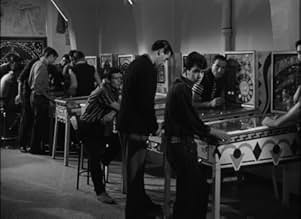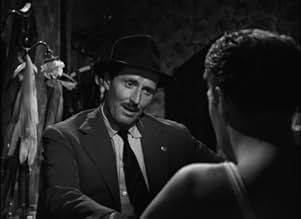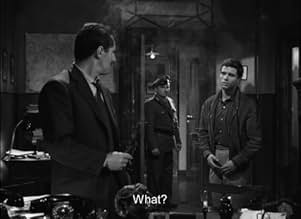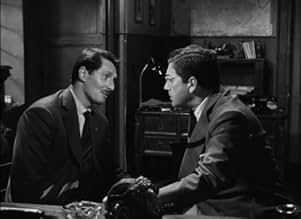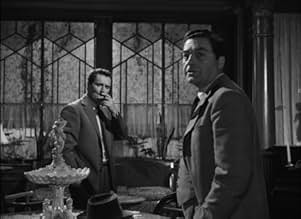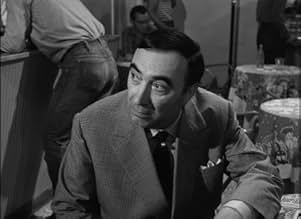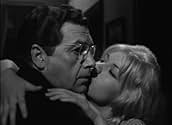NOTE IMDb
7,4/10
1,7 k
MA NOTE
Un inspecteur de police et son équipe tentent de résoudre deux crimes commis à moins d'une journée d'intervalle dans des appartements voisins.Un inspecteur de police et son équipe tentent de résoudre deux crimes commis à moins d'une journée d'intervalle dans des appartements voisins.Un inspecteur de police et son équipe tentent de résoudre deux crimes commis à moins d'une journée d'intervalle dans des appartements voisins.
- Réalisation
- Scénario
- Casting principal
- Récompenses
- 5 victoires et 3 nominations au total
Cristina Gaioni
- Virginia Caraci
- (as Cristina Gajoni)
Ildebrando Santafe
- Anzaloni
- (as Ildebrando Santafé)
Silla Bettini
- Il brigadiere Oreste
- (as Silla)
Avis à la une
Pietro Germi doesn't belong to "high class" of the Italian's directors as federico Fellini, Visconti, Rossellini and others, due he was a bad temper, rough and refuses make part of this circle, he was unique, he implied an American style in his pictures, In Maledetto Inbroglio was clearly one of them, the plot is split in two striking cases, a robbery and a murder, just connected by both were took place in next door, Pietro Germi plays a chief of police at task force in charge to investigate both cases, seemingly has some connection linking those weird happenings, two exhaustive hours were spent to find out the murder, despite Germi changes the ending, he imposes a frenetic non stop acting which thrilled the viewer, a hard and complex case to solve, due countless directions that arise at any moment, a fabulous picture, on those quaint Italian environment, with a bit odd humor, a movie to be discovered for the new generation of cinephiles, highly recommended!!!
Resume:
First watch: 2019 / How many: 1 / Source: DVD / Rating: 9.25
Resume:
First watch: 2019 / How many: 1 / Source: DVD / Rating: 9.25
I've always felt that the post-war period of Italian and Japanese films contains the highest concentration of quality films, and I continue to discover new gems. Having finally recently seen Germi's 'Seduced and Abandoned', I've begun digging deeper into his filmography, and was not disappointed with 'Un Maledetto Imbroglio' ('The Facts of Murder').
At its heart 'The Facts of Murder' is a pretty straightforward police procedural, albeit a fairly complex and convoluted one for 1959. A break-in investigation soon becomes much more complicated and Inspector Ciccio Ingravallo, played perfectly by Germi himself, must dig through a series of shady, duplicitous characters to uncover the truth.
While it may not have the suspense or surprises of a Hitchcock or a giallo, what this film has is pure watchability, thanks to the attention to detail of a master director at the top of his game.
The casting is superb, with a slew of credible characters, including the great Saro Urzì as the cheeky Marshal Saro and Claudio Gora as the slimy, sweaty Remo Banducci. The acting is superb, particularly Germi, who is easily one of the best actors I've seen, just super-interesting and an absolute joy to watch. The camera work effortlessly carries us through the story, never bringing attention to itself. The script is utterly believable, real-life quirky dialogue peppered with lovely comic moments.
I mean, the level of craft in this film is astounding, and even though it wasn't the most original plot, I just loved every moment of this film. I'll be watching it again at some point, just to catch some of the brilliant quips and perfectly acted moments.
At its heart 'The Facts of Murder' is a pretty straightforward police procedural, albeit a fairly complex and convoluted one for 1959. A break-in investigation soon becomes much more complicated and Inspector Ciccio Ingravallo, played perfectly by Germi himself, must dig through a series of shady, duplicitous characters to uncover the truth.
While it may not have the suspense or surprises of a Hitchcock or a giallo, what this film has is pure watchability, thanks to the attention to detail of a master director at the top of his game.
The casting is superb, with a slew of credible characters, including the great Saro Urzì as the cheeky Marshal Saro and Claudio Gora as the slimy, sweaty Remo Banducci. The acting is superb, particularly Germi, who is easily one of the best actors I've seen, just super-interesting and an absolute joy to watch. The camera work effortlessly carries us through the story, never bringing attention to itself. The script is utterly believable, real-life quirky dialogue peppered with lovely comic moments.
I mean, the level of craft in this film is astounding, and even though it wasn't the most original plot, I just loved every moment of this film. I'll be watching it again at some point, just to catch some of the brilliant quips and perfectly acted moments.
Although Pietro Germi has the distinction of having directed the prototype of the genre known as Commedia all'Italiana, his non-comedic films are strongly influenced by the cinema of North America and here he has given us a first-rate 'police procedural'.
He and his excellent collaborators Alfredo Giannetti and Ennio de Concini have also faced the daunting task of adapting Carlo Emilio Gadda's 'That awful mess on Via Merulina' which is a panorama of life in Fascist Italy of the late 1920's. Granted, it involves a murder investigation but the author has not felt the need to tell us whodunnit!
The investigating detective in this loose, updated adaptation is played by Signor Germi who has once again opted to direct himself and has created a fascinating character. His skill with actors is legendary and he draws fine performances from Eleonora Rossi Drago, Franco Fabrizi, Claudio Gora, Claudia Cardinale, Nino Castelnuovo and of course the ubiquitous Saro Urzi. Signorina Cardinale is again 'dubbed' as her voice was considered too coarse for the roles she played. She is on the brink here of her greatest decade and we hear her own voice for the first time in Visconti's 'Il Gattopardo' in 1963.
The plot of this is convoluted to say the least but we are carried along by Germi's taut direction, sharp editing by Roberto Cinquini and well-drawn characterisations. Germi's regular cinematographer Leonarda Barboni and composer Carlo Rustichelli contribute immeasurably. Rustichelli's score is particularly full-blooded and he has composed a beautiful and haunting canzona sung by his daughter Alida, entitled 'Otherwise I'll die' which reflects the passionate relationship between the characters played by Cardinale and Castelnuovo. Viewers will no doubt recognise in Cardinale's frantic run after the police car a distinct echo of Anna Magnani's iconic dash in 'Rome, open City'.
Opinions differ as to whether Germi should be counted among the great Italian directors. I suppose it depends upon one's criteria. His most popular films of course have been his beautifully observed satirical comedies but from his directorial debut with the melodrama 'Il Testimone' he has never ceased to show a capacity to tell a story, engage our emotions and to get the very best from his actors. He is sorely in need of reappraisal.
He and his excellent collaborators Alfredo Giannetti and Ennio de Concini have also faced the daunting task of adapting Carlo Emilio Gadda's 'That awful mess on Via Merulina' which is a panorama of life in Fascist Italy of the late 1920's. Granted, it involves a murder investigation but the author has not felt the need to tell us whodunnit!
The investigating detective in this loose, updated adaptation is played by Signor Germi who has once again opted to direct himself and has created a fascinating character. His skill with actors is legendary and he draws fine performances from Eleonora Rossi Drago, Franco Fabrizi, Claudio Gora, Claudia Cardinale, Nino Castelnuovo and of course the ubiquitous Saro Urzi. Signorina Cardinale is again 'dubbed' as her voice was considered too coarse for the roles she played. She is on the brink here of her greatest decade and we hear her own voice for the first time in Visconti's 'Il Gattopardo' in 1963.
The plot of this is convoluted to say the least but we are carried along by Germi's taut direction, sharp editing by Roberto Cinquini and well-drawn characterisations. Germi's regular cinematographer Leonarda Barboni and composer Carlo Rustichelli contribute immeasurably. Rustichelli's score is particularly full-blooded and he has composed a beautiful and haunting canzona sung by his daughter Alida, entitled 'Otherwise I'll die' which reflects the passionate relationship between the characters played by Cardinale and Castelnuovo. Viewers will no doubt recognise in Cardinale's frantic run after the police car a distinct echo of Anna Magnani's iconic dash in 'Rome, open City'.
Opinions differ as to whether Germi should be counted among the great Italian directors. I suppose it depends upon one's criteria. His most popular films of course have been his beautifully observed satirical comedies but from his directorial debut with the melodrama 'Il Testimone' he has never ceased to show a capacity to tell a story, engage our emotions and to get the very best from his actors. He is sorely in need of reappraisal.
Well worth seeing for many reasons: for the complex plot with many connections among those involved in a theft and a seemingly unrelated murder; for a look at Italy in 1959; for the good acting and fast cutting; and for the humor in the script.
This is a good crime/thriller movie. Anyone who likes similar movies, with police investigations/whodunnit as a plot, will like this as well. It's not a masterpiece and the conclusion feels a bit rushed and not too clever, but it's enjoyable overall, without plot holes and somewhat unpredictable. I didn't guess who the culprit is, so this movie is successful in my books. Don't expect mindblowing twists/action/car chases etc. Biggest quality here is the verisimilitude and the acting. Germi is excellent, his character is magnetic and charismatic, i 'd say even that his character is ahead of his time. Of course it's a bit outdated but this is totally norma for a 1959 movie. This is a 2 hours/B&W 1958 movie and it never got boring. Every fan of this genre will enjoy it.
Le saviez-vous
- AnecdotesThe murder takes place at 44 Piazza Farnese in Rome, Italy.
- GaffesThe cameraman is clearly visible on the left of the frame in the actual murder scene.
- Versions alternativesA restored version has been released in 1999, edited by Vincenzo Verzini.
- ConnexionsFeatured in Cinema forever - Capolavori salvati (2001)
Meilleurs choix
Connectez-vous pour évaluer et suivre la liste de favoris afin de recevoir des recommandations personnalisées
- How long is The Facts of Murder?Alimenté par Alexa
Détails
- Durée1 heure 55 minutes
- Couleur
- Rapport de forme
- 1.37 : 1
Contribuer à cette page
Suggérer une modification ou ajouter du contenu manquant

